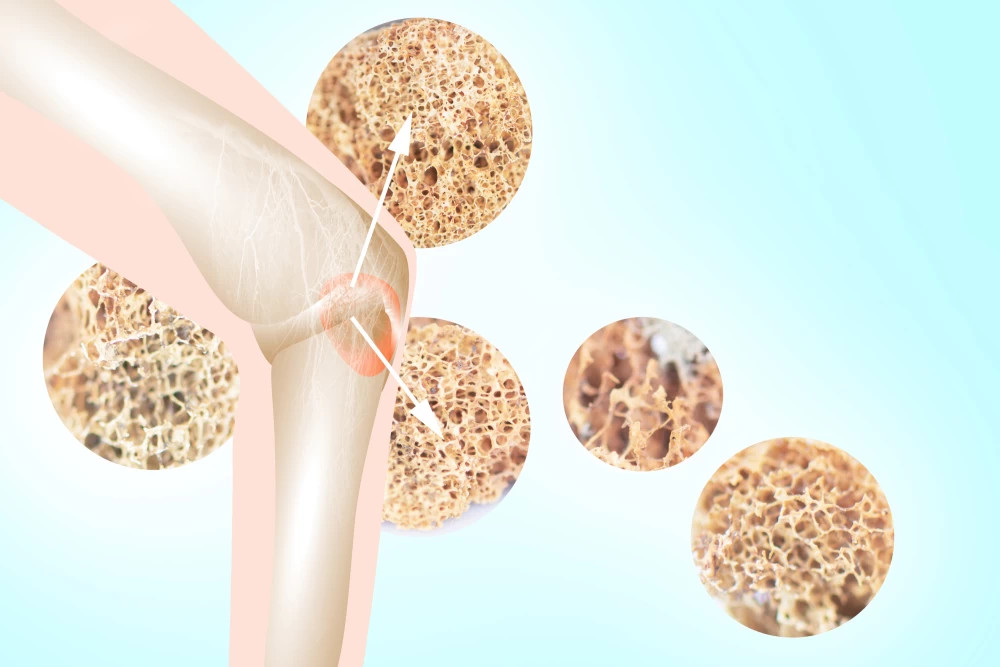
- 1st May 2023
Table of Contents
Bone Health and Intermittent Fasting
As more people learn about the possible health benefits of intermittent fasting, the practise has grown in popularity as a means of weight loss. There are, however, worries about its effect on bone health. Researchers have found that people who intermittently fast may have lower bone mineral density and a higher risk of fractures and osteoporosis. The breakdown of nutrient stores, such as calcium in the bones, is one mechanism by which the body conserves energy during fasting. Intermittent fasting has been linked to low oestrogen levels in women, which has been linked to poor bone health. However, the negative effects of intermittent fasting on bone health can be reduced by taking certain precautions. One method is to pay close attention to mealtime intake. Dairy products and other sources of calcium and vitamin D, as well as supplements for those who cannot get enough from their diets, fall under this category. Strength training can also help people who follow intermittent fasting diets improve their bone density and lessen their vulnerability to fractures.
Caloric Restriction and Hormone Regulation are Two of IF's Many Advantages
Weight loss and improved health are just two of the many reasons why intermittent fasting (IF) is gaining in popularity. Calorie restriction, one of the main effects of IF, can help people lose weight and improve their metabolic health. Fasting can help reduce insulin resistance, inflammation, and oxidative stress by reducing overall caloric intake. Hormone regulation is another advantage of IF. Human growth hormone (HGH) increases have been demonstrated to aid in calorie deficit suppression and protein synthesis. During fasting periods, insulin levels tend to drop, which may also help IF increase sensitivity to the hormone. The risk of developing type 2 diabetes can be decreased and blood sugar levels stabilised in this way. Although IF has many promising outcomes, we must also take into account its feasible drawbacks. Reduced mineral density in the bones has been linked to prolonged calorie restriction through IF, according to some research. However, more study is required on this subject before firm conclusions can be drawn. The practise of intermittent fasting has been linked to numerous potential health benefits.

Consequences of IF include calcium deficiency and muscle atrophy
Intermittent fasting has a number of potential side effects, including a decreased calcium intake and muscle wasting (IF). Bone health depends on a steady intake of calcium by the body. While intermittent fasting has been linked to health benefits, low calcium intake has been linked to the practise. In women who are already at a higher risk for osteoporosis, this can further increase that risk. In addition, the body requires protein to construct and maintain muscle tissue, which may be lost during IF. If a person skips meals or goes without food for an extended period of time, their body may begin to break down muscle tissue for energy. Over time, this can lead to weakness and restricted movement. Individuals who practise IF should make sure they get enough calcium from foods like dairy, leafy greens, and fortified plant-based milks during their eating periods to reduce these risks. Meals should also include lean proteins like eggs, fish, or chicken to help with muscle development and maintenance.
Methods Suggested for Increasing Bone Mass
While there is evidence that intermittent fasting can improve bone density, doing so safely requires adhering to best practises. Bone density training is important for warding off osteoporosis and keeping your bones strong as you age. Weight-bearing exercises, like walking or weight lifting, are suggested because they promote bone growth. Consuming an adequate quantity of calcium and vitamin D is also critical. Milk, cheese, yoghurt, and leafy greens like kale and spinach are all good sources of calcium. Fatty fish like salmon and tuna, as well as fortified dairy products, are good sources of vitamin D. Reducing your alcohol and tobacco use is also recommended, as these habits have been linked to bone loss. Last but not least, if you're concerned that a preexisting condition or a medication you take might be affecting your bone health, consulting a doctor can help you take the right steps towards building strong bones through intermittent fasting.
Bone-Healthy Vitamin and Mineral Supplements

It's impossible to overstate the significance of vitamin and mineral intake for bone health. Although calcium and vitamin D have received the most attention, other important nutrients also contribute to bone health. Magnesium, zinc, copper, manganese, and vitamin K2 are all vital nutrients for strong bones, but they are especially effective when taken together. Bones are made of a mineral called hydroxyapatite, and magnesium plays a role in the formation of these crystals. Collagen is a key structural protein in bones, and zinc plays a role in its synthesis. Collagen cross-links are formed when copper combines with lysyl oxidase. Vitamin K2 aids in the regulation of calcium metabolism, and manganese is needed for the production of enzymes that promote bone growth. Although bone health supplements can be helpful, they may not be enough on their own. Bone health is supported not only by consuming a balanced diet or taking dietary supplements, but also by engaging in regular physical activity. Because of the potential long-term effects of inadequate nutrition on bone density, people who engage in intermittent fasting should be especially cognizant of the nutrients they consume during periods of restricted eating.
Bone-Fortifying Workouts
Regular exercise is one of the best ways to strengthen bones. Bone density can be increased through a variety of exercises, particularly weight-bearing ones like walking, jogging, dancing, and weightlifting. Bone strength can also be improved by engaging in resistance exercises using weights or resistance bands. Bone density and strength are improved as a result of these routines. However, those who engage in intermittent fasting (IF) may have special concerns about the effects of exercise on bone health. Even though there may be health benefits to intermittent fasting, it's important to make sure you're still getting enough food to fuel your workouts. Some studies have linked prolonged fasting to lower bone density if it isn't accompanied by a healthy diet. Overall, whether or not you engage in IF, including regular exercise in your routine can be an effective way to boost bone health. However, if you're thinking about combining your exercise routine with a particular diet like IF, it's essential that you keep a healthy diet and talk to your doctor first.














